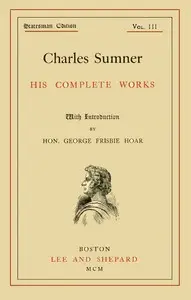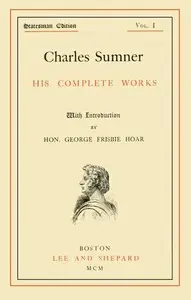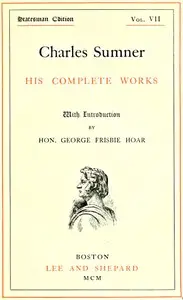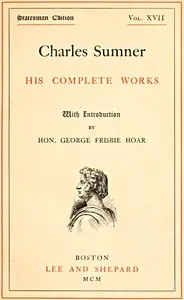"Charles Sumner: His Complete Works, Volume 14 (of 20)" by Charles Sumner is a historical compilation written in the late 19th century. This volume contains a collection of speeches and writings of Charles Sumner, a prominent American politician and abolitionist, focusing on notable topics concerning justice, civil rights, and legislative practices during his time in the Senate. The topics highlight the pressing political issues and moral questions faced by the United States during the Reconstruction Era following the Civil War. The opening of this volume presents the context of Sumner's speeches in the Senate, beginning with a discussion on the contested election of Hon. John P. Stockton from New Jersey. Sumner argues against the legitimacy of a plurality vote in this election, emphasizing the importance of majority rule and drawing parallels to historical precedents from English parliamentary law. He asserts that the Constitution mandates senators be elected by a majority of votes, thus setting up his subsequent discussions on the principles of democracy and justice. Through a detailed analysis of the debate, Sumner showcases his commitment to lawful representation and the need for consistent application of democratic principles in governance. (This is an automatically generated summary.)
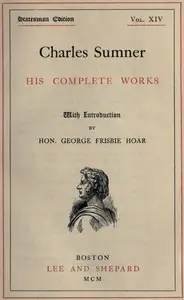
Charles Sumner: his complete works, volume 14 (of 20)
By Charles Sumner
"Charles Sumner: His Complete Works, Volume 14 (of 20)" by Charles Sumner is a historical compilation written in the late 19th century. This volume co...
Charles Sumner was an American lawyer, politician, and statesman who represented Massachusetts in the United States Senate from 1851 until his death in 1874. Before and during the American Civil War, he was a leading American advocate for the abolition of slavery. He chaired the Senate Foreign Relations Committee from 1861 to 1871, until he lost the position following a dispute with President Ulysses S. Grant over the attempted annexation of Santo Domingo. After breaking with Grant, he joined the Liberal Republican Party, spending his final two years in the Senate alienated from his party. Sumner had a controversial and divisive legacy for many years after his death, but in recent decades, his historical reputation has improved in recognition of his early support for racial equality.

